Poetry in Motion

Playwright Marcus Gardley is the latest recipient of a Will Glickman Award, presented annually to ''the author of the best play to have its world premiere in the Bay Area.''
Marcus Gardley (B.A., '01), a rising playwright from West Oakland, began as a poet at SF State. But when he kept telling his classmates how to read his poems aloud and jotting stage directions for them, his creative writing professors told him he was really writing plays.
''I took my first playwriting class at State and knew that's where I belonged,'' says Gardley, now on the faculty at Brown University. In April he received the Bay Area's prestigious Will Glickman Award for ''The House That Will Not Stand.'' Commissioned by Berkeley Repertory Theatre, which co-produced its 2014 premiere with Yale Repertory Theatre, the play had an extended run at London's Tricycle Theatre and next season plays at Chicago's Victory Gardens Theater.
San Francisco Chronicle critic Robert Hurwitt called it ''a richly layered, insightful, revealingly magical-realist tale of free women of color trying to cope with the new, much more prejudicial and restrictive American racial laws in formerly French New Orleans in the 1830s.''
Gardley's latest work, ''An Issue of Blood,'' which premiered in April at the Victory Gardens, deals with another seismic moment in American history that changed the status and treatment of African-Americans. It's set in 1670s Virginia, around the time of Bacon's Rebellion, when white and black indentured laborers -- Irishmen and Africans -- joined together in the rebellion against the colonial government. The uprising so alarmed the ruling planters that laws were enacted making people of African ancestry permanent slaves.
''If you were a 'Negro,''' says Gardley, using the term of the time, ''you became a lifelong slave. If you were white, you could remain indentured. It was based solely on skin.'' He has a passion for stories that illuminate hidden histories, exhaustively researching the time and place and collecting objects his characters might have held.
''I take these buried histories and dramatize them, using poetic contemporary language,'' says Gardley, now hard at work on a musical about the Harlem Renaissance. ''It's a mash-up in a way. I feel like the past is always in dialogue with the present.''
Gardley cites Brighde Mullins and Roy Conboy as influential professors at SF State, where he learned how to get the work out of his head, onto the page and then to the stage.
''The play is only a blueprint. You bring in the other elements -- acting, directing, design -- and it's a much richer, deeper art work. That was exciting to me.'' He credits Conboy with getting him to trust himself and take risks.
Professor Conboy, who produced Gardley's first plays on campus, recalls,''I could see that Marcus was a born storyteller with a poet’s sense of everyday language and a deep and empathetic feel for the human characters who peopled his plays.''
Photo by LISA PREDKO